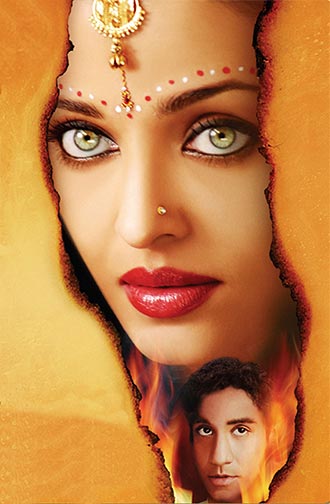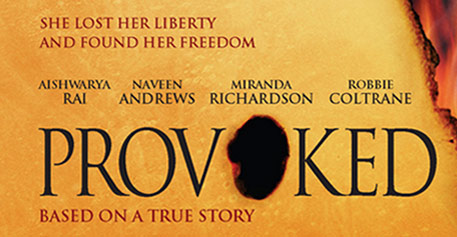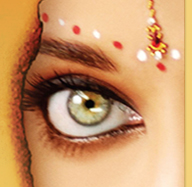Provoked: based on the true story of a British woman, Kiranjit Ahluwalia
This was the official website for the movie, Provoked, based on the true story of a British woman, Kiranjit Ahluwalia, who was jailed in 1989 for killing her violent husband by setting him on fire. The British film was inspired by Ms Ahluwalia's autobiography, in which she describes 10 years of rape and abuse at the hands of her husband.
Content is from the site's archived pages and other outside sources.
Address: Jag Mundhra.
Countries: United Kingdom and India.
Year: 2006. Duration: 113 min.
Genre: Drama.
Actors: Aishwarya Rai (Kiranjit Ahluwalia), Miranda Richardson (Veronica Scott), Naveen Andrews (Deepak Ahluwalia), Nandita Das (Radha), Rebecca Pidgeon (Miriam), Robbie Coltrane (Edward Foster), Steve McFadden Irons (O'Connell), Raji James (Anil), Deborah Moore (Jackie). Screenplay: Carl Austin and Rahila Gupta; Based on the book "Circle of light" by Rahila Gupta and Kiranjit Ahluwalia.
Production: Sunanda Murali Manohar. Music: AR Rahman.
Photography: Madhu Ambat.
Assembly: Jag Mundhra and Sanjeev Mirajkar.
Production Design: Peter Joyce. Costume: Sarah Tapscott.
Released in the United Kingdom: 6 April 2007.
Premiere in Spain: 11 January 2008.
The official trailer of Provoked.
|
|||||||||||||||||||||||||||||||||||||||
TOMATOMETER CRITICS 29% | AUDIENCE 70%
Inspired by the true story of Kiranjit Ahluwalia, Jag Mundhra's Provoked tells the tale of a battered wife pushed to the ultimate act of defiance. As a nineteen year old girl living in a small Punjab village with her overbearing sisters and their husbands, Kiranjit Ahluwalia (Aishwarya Rai) aspired to get a college education and see the world. Despite her ambitious plans, however, Kiranjit put her entire future on hold the moment she met handsome family friend Deepak (Naveen Andrews). Later, after a whirlwind romance, Kiranjit and Deepak married and prepared to move into Deepak's home in a quaint suburb of London. Kiranjit's storybook romance would quickly give way to a terrifying reality however when, over the course of the following decade, the loving bride suffered a relentless torrent of emotional and physical abuse of her tyrannical husband. Eventually pushed to her breaking point and desperately fearing for the safety of her children, Kiranjit killed Deepak and was subsequently sentenced to life in prison. Though Kiranjit was at first reluctant to share the details of her harrowing experience, she eventually became convinced that the only way to break the cycle of violence was to share her story with the world. Miranda Richardson, Rebecca Pidgeon, and Robbie Coltrane co-star in a docudrama that encourages viewers to take a closer look at the proliferation of domestic violence.
The film Provoked (2006) is a fictionalized account of Kiranjit Ahluwalia's life. Her case brought significant attention to the issue of domestic violence, particularly within non-English speaking immigrant families in Western countries, and led to changes in the legal treatment of domestic abuse victims in the United Kingdom. While studying English law and its intersection with domestic violence in immigrant communities during my postgraduate years in England, I came across her case, R v Ahluwalia. It redefined the legal understanding of "provocation" in cases involving battered women, reclassifying her crime as manslaughter instead of murder. This landmark decision also paved the way for the release of Emma Humphreys and Sarah Thornton in the same year.
Fast forward to today, I work as a trucking accident attorney in the Houston, TX area. My focus is on representing individuals who have suffered life-altering injuries or losses due to negligence. While the nature of my work is different, the emotional toll and the stories of resilience I encounter often remind me of Kiranjit's journey. Watching Provoked recently on Netflix brought back memories of her case. Though the film dramatizes certain aspects, it captures the harrowing reality of abuse and the strength it takes to fight back against injustice.
In my line of work, I often see clients who feel powerless against larger systems—whether it's a trucking company or an insurance giant. Their struggles, much like Kiranjit's, are a testament to the human spirit's resilience. However, the emotional weight of these cases can be overwhelming. Balancing the demands of my professional life with my personal well-being is a constant challenge, but the stories of those I represent inspire me to keep going. Kiranjit Ahluwalia's courage serves as a reminder of why I chose this path—to advocate for those who feel unheard and to help them reclaim their lives. Marci Wallace
'I never wanted to kill my husband'
Apr 1, 2007| timesofindia.indiatimes.com
MANDVI SHARMAKiranjit Ahluwalia faced torture for 10 years before deciding she has had enough of it. She killed her husband and learnt to live again.
Kiranjit Ahluwalia faced torture for 10 years before deciding she has had enough of it. She killed her husband and learnt to live again.
The story of our lives start when we are born, but my life's story began after I got married." This is how Kiranjit Ahluwalia looks at her life. She's the woman who got a bravery award from Cherie Blair for killing her abusive and tortuous husband. She is also the inspiration behind Provoked, Aishwarya Rai's tour de force against domestic violence. Kiranjit recounts the story of her life – the 10 years of torture that she faced from her husband Deepak Ahluwalia...
The beginning: "I met Deepak in Canada, in my elder sister's home. He seemed like a charming and good-looking guy. We soon got married. Within the first week of marriage, I realised that he was a very violent man. He would hit me without any reason. I was too shocked to react. He had a split personality."
The decision: "I decided to return to India and file for a divorce but my family and my in-laws refused to support me. In the meanwhile, he kept on getting more violent. He would beat me up mercilessly and would brand me with a hot iron. Then he would tell me 'I am your husband and I can do anything to you.' I had had enough... I even tried to commit suicide twice."
The incident: "By 1986, I had two sons and was very sure that I don't want them to be influenced by their father. He wasn't taking responsibility of the family and had even started bringing women to our home. I decided to burn his legs so that he could not run behind me and torture me. I never knew he would die. I did not even once think that I would kill him."
Freedom at last: "To me, prison was freedom. I could eat, drink, sleep, laugh and do whatever I wanted to do. It was freedom from abuse and beatings. I learnt to live there. I was there for three years and four months, after which they acquitted me."
Second chance: "I had no house, no job and had to look for a school for my kids once out. But people came to my help. They gave me a house. I did not work for two years but they took care of all my expenses and my children's education. Princess Diana told me to write a book on my life, which I co-authored with Rahila Gupta. I don't need a man any more... I am not willing to suffer silently now."
Ash & Provoked: "I was surprised to know Ash was playing me in Provoked, I was also very shy in front of her. But she was very understanding and sweet. I am satisfied with her performance. She does look and feel like Kiranjit in Provoked."
'I wanted him to stop hurting me'
Julie Bindel | Wed 4 Apr 2007 | theguardian.com
After suffering years of abuse, Kiranjit Ahluwalia killed her violent husband - and ended up in jail. When she was finally freed on appeal, her case changed the face of British justice. As a film based on her story is released, Julie Bindel meets her for an interview
At first glance, Kiranjit Ahluwalia seems an unlikely subject for a film. She lives in a three-bedroom house in Slough, has brought up two sons - both at university - and works the nightshift at her local Royal Mail sorting office. So far, so average.
But Ahluwalia has led an extraordinary life, which has inspired the new British Asian film, Provoked: A True Story. The film traces her journey - from a victim of domestic violence to convicted murderer, to the woman who changed public opinion towards battered women who kill their abusers. Her case also helped change the law.
Ahluwalia arrived in Britain in 1979 from India, aged 24, following an arranged marriage. She spoke little English when she moved in with her husband Deepak's family in London, where Deepak immediately began to abuse her. "I did not want to say anything and spoil my family's excitement," she says, "and I hoped it would not continue ... He would push me about, yank my hair, hit me and drop heavy pans on my feet. I was treated like a slave. He would not allow me to drink black coffee or eat chillies, for the simple reason that I enjoyed them. But I was so frightened of him that I didn't say anything. I often lay awake at night next to him because I was too frightened to sleep." Deepak also raped her frequently, telling her that this was his right. She received no help from his family - Deepak threatened them if they ever intervened.
Over the years, Ahluwalia bore two sons, who often witnessed the violence. One night, when she had gone to sleep after cooking Deepak's dinner, he woke her up and demanded money. When she refused, he tried to break her ankles by twisting them. He then picked up a hot iron and held it to her face. Eventually Deepak fell asleep and Ahluwalia was consumed with the rage she had suppressed for 10 years. Approaching him with a can of petrol, she poured it over Deepak's feet and set them alight. "I couldn't see an end to the violence," she says now. "I decided to show him how much it hurt. At times I had tried to run away, but he would catch me and beat me even harder. I decided to burn his feet so he couldn't run after me."
Five days later, in May 1989, Deepak died, and Ahluwalia was charged with murder. She pleaded not guilty, but the defence made little of the violence she had endured. The prosecution suggested that Ahluwalia was a jealous woman who had killed her husband because he was having affairs. She was convicted of his murder in December 1989, and sentenced to life in prison.
I first met Ahluwalia in 1991 after joining the campaign to free her that was being run by the Asian feminist organisation, Southall Black Sisters (SBS). When Ahluwalia heard that I was visiting Sara Thornton (another woman who had killed her violent husband and was being held at the same prison), she asked if I could bring her two young sons to visit, as well as some red chilli peppers. Her boys were being cared for by relatives and I was able to bring them to the visiting centre - the chillies had to be smuggled in and passed under the table. "The food is terrible in here," she said at the time. "English food has no taste."
"At the time, I had no idea what was happening to me," says Ahluwalia now. "All I could think about was my children, and if I would ever see them again."
Following a campaign, led by SBS, Ahluwalia's conviction was quashed on appeal in 1992. The court accepted some new evidence - that she had not been aware she could plead guilty to manslaughter on the grounds of diminished responsibility, and that she had been suffering from severe depression when she killed her husband.
Ahluwalia admitted manslaughter at the retrial, and was released and greeted by hundreds of cheering supporters and media from around the world. The next day, her beaming face was on the front page of many newspapers, surrounded by her family, campaigners and legal team.
Ahluwalia's successful appeal against her murder conviction set a historic precedent - that women who kill as a result of severe domestic violence should not be treated as cold-blooded murderers. As Ahluwalia says, "I never intended to kill him, I just wanted him to stop hurting me."
Now 50, Ahluwalia has been transformed from a cowed woman, with little confidence, into a strong, bright, funny individual. When I call her, she insists I come to dinner. "Come tomorrow, I have already started cooking," she says. Her enjoyment of life is obvious and she says she is, once again, the happy individual she was before her marriage. "I had a happy childhood," she says, "and was not used to being treated badly until I met Deepak."
The film of her life has the Bollywood superstar Aishwarya Rai in the title role, but is much grittier than a typical Bollywood film. "The Bollywood crowds want singing and dancing and fantasy land," says the director, Jag Mundhra. "This is too realistic and hard-hitting to be Bollywood."
In the 18 years since she killed her husband, Ahluwalia has largely come to terms with what happened that night, but she still recoils in horror at how Deepak died. When she first saw Provoked, she sat beside Rai, who "held my hand the whole time. I just could not bear the scenes where he is burned and screaming. I could never look at those photos of his injuries during my trial."
On leaving prison, Ahluwalia settled back into her life, continuing to raise her sons, and doing both paid and voluntary work against domestic violence. She often worried what people would think if they discovered her story. "I never really wanted people at work to know what had happened, but since the film, I talk openly about prison," she says. "The men, mostly English, say to me, 'It wasn't your fault ... it was what he did to you.'"
Ahluwalia says she is often approached in the street by women keen to talk to her about their own experiences of domestic violence. "Before my case, it was far worse for Asian women suffering domestic violence," says Ahluwalia. "They used to feel shame, and family honour was seen as more important than their suffering. But now at least those women can look to me as a survivor."
Her sons, Ravi and Sanjay, now 21 and 23, and both at university, are a great source of pride. Were they supportive of the film? "Yes, but sometimes they are surprised at how well known my case is," she says. "One day it was discussed in Ravi's class [he is a law student], with the lecturer talking about the significance of the Ahluwalia case. He said to me, 'Mummy, I was in shock.'"
Since coming out of prison, Ahluwalia says she has enjoyed "every minute" of her life. "I have gained so much. I am the queen of my house," she laughs. "No one talks to me with even the slightest bit of disrespect. I make all my own decisions, there is no slavery any more."
What remains most important for her is that women are inspired by her story of survival. "I want to show the women who are suffering that they are not weak," she says. "We are hard workers, we are strong. Women can do anything, and we can do it without men".
CRITICS REVIEWS
May 18, 2007 | Rating: 2/4
Kamal Al-Solaylee
Globe and Mail
Top Critic
[Director] Mundhra can't control the expansiveness of the melodrama or focus on the terseness of realism. Every character in Provoked, from victims to tyrants, Indian to English, loud to quiet, ends up as a grossly exaggerated comic creation
+++
May 17, 2007 | Rating: 1.5/4
Michael Phillips
Chicago Tribune
Top Critic
The true-crime drama Provoked has everything to offer except a cinematic point of view and a knack for depicting human beings under duress. Those are major drawbacks.
+++
May 17, 2007
Ann Hornaday
Washington Post
Top Critic
Unfortunately, Provoked possesses the tinny production values and schmaltzy music of a prime-time special, despite its ensemble of terrific actors.
+++

AUDIENCE REVIEWS
Dy M **** June 17, 2014
This film should reach the doors of battered and abused women out there...
+++
Heather M** March 1, 2013
This has a great cast, but it has a pretty slow and forgettable story.
+++
Josi A February 3, 2013
alguem tem esse filme eu quero assistir
+++
Terrie B ***** July 13, 2012
Aish should have won an Oscar for her acting in this one...
+++
Tania C **** December 27, 2011
This is a must see for all women! Ashwariya is absolutely amazing in it!
+++
Juan B **** December 6, 2011
wow what women had to go thru so sad cried couple of time.
+++
Nidhi J *** ½October 2, 2011
A thought provoking well made film based on a true story
+++
Super Reviewer
Ilyaas H *½July 10, 2011
A well-picked but badly told story, director Jagmohan Mundhra caricatures practically everything on screen - taking away from the realism that could've made Provoked a great movie, and Aishwarya Rai, indifferent from her character, doesn't help the proceedings.
+++
Sri G. **** April 8, 2011
Excellent screenplay..
+++
Jennifer M *** March 9, 2011
A good movie to watch, though hard to watch at the same time. While society deals with spousal abuse (mental, physical, and sexual) all the time, sometimes we forget that if we don't do something to help, others will suffer the same fate. Aishwarya Rai plays Kiran, a young married Indian woman (in an arranged marriage which is traditional for many Indian cultures even today) who wants nothing but to please her husband and family - again, this movie deals with different cultural aspects and traditions so you must keep an open mind if you're unfamiliar with Eastern cultures. However, her husband's temper rises throughout the years of their marriage, with his blaming her for getting him upset when she confronts him about his cheating and affairs (and drinking later on). After another night of abuse, she snaps and sets her husband on fire. After he dies from his injuries, she is sent to prison for murder. However, prison begins her struggle to freedom. After meeting Ronnie (Miranda Richardson), a mother herself who had a similar married life as Kiran, Kiran learns to find her voice and stand up for all those women who have come before her. She is ultimately freed by the judicial system in a landmark case called "R v Ahluwalia", redefining provocation in cases of battered women in the UK. While there were liberties taken with this 'based on a true story' film (like many other 'true event films', the story stills holds a deep and true meaning that we must stand up for what is right.
+++
Dinesh P ½February 20, 2011
happens to be one of very few movies that I like ARB's performance..!!
+++
Niral G *** ½February 2, 2011
A good message through an above-average performance and plot.
Anirban C *** ½December 28, 2010
gooseflesh :D based on kiranjit s autobiography : in total a nice watch .
+++
**** NaWia
Super Reviewer
NaWie M July 28, 2010
This truth had to be told like many others out there which are waiting and happening at second we write/read or hear about those. Great perfomance by Aishu.
+++
***** Zainab A July 2, 2010
Suffering in silence is not the way out." It's the true story of a Punjabi woman named Kiranjit Ahluwalia who leaves India to marry a London-based guy (Naveen Andrews), only to be badly abused. She ends up in prison for murdering her abusive husband.
I can't imagine enduring what she did but her suffering caused her to grow considerably stronger than she thought possible and luckily in her case justice prevailed. In many cases of spousal abuse this is not the case... Aishwarya is captivating! Worth watching especially if you've experienced this type of treatment or know someone who has.

More Background On ProvokedTheMovie.com
ProvokedTheMovie.com served for many years as the official online home for Provoked, the 2006–2007 British-Indian drama based on the real-life case of Kiranjit Ahluwalia. The website functioned as a central hub where audiences, film scholars, activists, and the general public could learn about the movie, its production, its cast, its historical basis, and its broader social message. Although the site now exists primarily in archived form, its content remains an important digital record of a film that helped raise awareness of domestic violence, the immigrant experience in the United Kingdom, and legal reform for battered women.
This article provides an in-depth examination of ProvokedTheMovie.com, its purpose, structure, content, and cultural context. It also explains the film behind the site and why the website continues to hold relevance in discussions around representation, justice, and the evolution of social cinema.
Background of the Film Behind the Website
Provoked tells the true story of Kiranjit Ahluwalia, a Punjabi woman who moved to London after an arranged marriage and endured ten years of severe domestic abuse at the hands of her husband, Deepak Ahluwalia. The abuse included repeated beatings, sexual violence, psychological torture, and social isolation. In 1989, after a particularly brutal attack, Kiranjit set fire to her husband's feet in an attempt to stop him from harming her. He later died from his injuries, and she was subsequently sentenced to life in prison for murder.
Her appeal, supported by activists and the Southall Black Sisters, resulted in a landmark legal decision that redefined how British law treats cases of domestic abuse, provocation, and diminished responsibility. This made her case historically significant, not only for the South Asian community but for survivors of domestic violence across the UK.
The film captures these events through dramatization, starring Aishwarya Rai as Kiranjit, Miranda Richardson as Ronnie, Nandita Das as Radha, Rebecca Pidgeon as Miriam, and Robbie Coltrane as Lord Edward Foster.
ProvokedTheMovie.com was created to support this film’s message, educate audiences, and provide context for the real story.
Purpose and Goals of ProvokedTheMovie.com
The website was designed with several clear goals:
1. Promote the Release of the Film
As the official online presence for Provoked, the site offered trailers, cast information, production notes, and marketing materials.
2. Inform Viewers About the True Story
The site provided a synopsis that closely aligned with Kiranjit Ahluwalia’s real experiences, giving viewers access to the background behind the dramatization. This was crucial in helping audiences understand the real-life stakes of the case.
3. Highlight Social Issues
The film and the website brought attention to:
-
Domestic violence
-
Immigrant women’s vulnerability
-
Cultural silence surrounding abuse
-
Racism and isolation
-
Systemic legal biases
4. Encourage Public Awareness and Advocacy
Given the involvement of activist organizations in the real case, the website functioned as an educational tool that could be used by advocates, students, support workers, and legal scholars.
5. Preserve the Film’s Legacy
Even after theatrical release, ProvokedTheMovie.com maintained a digital archive of information about the movie, ensuring it remained visible to future audiences, especially those studying women’s rights, immigration, or film history.
Website Menu Structure and Features
While the site is now accessible primarily through archived versions, several key sections were part of its layout:
Home Page
The homepage introduced the film, highlighted the stars, and presented the synopsis. It featured:
-
Promotional stills
-
A direct summary of Kiranjit’s case
-
Film credits
-
Basic factual details: year, genre, runtime, country of production
Synopsis Page
This section elaborated on the plot, explaining how the violence escalated, how Kiranjit responded, and how the legal battle unfolded.
Cast and Crew Page
This portion listed:
-
Lead actors
-
Screenwriters
-
Producers
-
Director
-
Composer (notably A. R. Rahman)
-
Cinematographer and production design team
Media and Press Page
This section contained press highlights, critic responses, and featured reviews from major outlets. It was designed to demonstrate the film’s reception and support promotional efforts.
Photo and Trailer Gallery
Visitors could view official images and watch the theatrical trailer.
About the True Story
Many early viewers were unaware that Provoked was based on real events. The website provided details about Kiranjit’s life, her legal battle, and the reforms that followed.
Production Details Featured on the Website
ProvokedTheMovie.com showcased elaborate production information, helping audiences appreciate the film’s craftsmanship:
Director
Jag Mundhra, known for socially conscious filmmaking.
Actors
-
Aishwarya Rai as Kiranjit
-
Naveen Andrews as Deepak
-
Miranda Richardson as Ronnie
-
Nandita Das as Radha
-
Robbie Coltrane as Lord Foster
-
Rebecca Pidgeon as Miriam
Behind-the-Scenes Credits
-
Screenplay by Carl Austin and Rahila Gupta
-
Based on the autobiography Circle of Light
-
Music by A. R. Rahman
-
Production by Sunanda Murali Manohar
-
Cinematography by Madhu Ambat
-
Editing by Jag Mundhra and Sanjeev Mirajkar
-
Production design and costumes by specialized teams
Popularity and Audience Reach
Cultural and Demographic Appeal
ProvokedTheMovie.com drew traffic from:
-
The South Asian diaspora
-
UK audiences aware of the Ahluwalia case
-
Bollywood and Indian cinema fans
-
Activists and feminist groups
-
Legal scholars
-
Students studying domestic violence or criminology
International Distribution Boosted Visibility
The film released in:
-
The United Kingdom (April 2007)
-
India
-
Spain (2008 premiere)
-
North America (limited screenings and DVD distribution)
These releases expanded the website’s audience significantly.
Website Location and Film Setting
Film Setting
The movie’s story takes place primarily in:
-
London suburbs
-
Women’s prison environments
-
Immigrant family homes
These urban and domestic settings are reflected heavily in the movie’s tone and the website’s still photography.
Proximity to Real Events
While the film dramatizes certain elements, the website emphasized the accuracy of the emotional and social context surrounding Kiranjit’s experiences.
Press and Media Coverage Highlighted on the Website
While the website itself showcased selected reviews, the broader media response was mixed:
Critics
Many professional critics felt that:
-
The film leaned into melodrama
-
Some performances were exaggerated
-
Production values appeared television-like
However, they consistently praised:
-
The seriousness of the subject
-
Miranda Richardson’s performance
-
The intent behind the film
Audience Reception
General audiences reacted far more positively:
-
Many praised the emotional power
-
Survivors of abuse felt represented
-
Aishwarya Rai was widely commended
-
Viewers appreciated the film’s message and accessibility
Audience scores often exceeded 70%, demonstrating that the film resonated deeply outside of critical circles.
Cultural and Social Significance
1. Domestic Violence Awareness
The website amplified an essential message:
Domestic abuse can be hidden, complex, and culturally specific.
The film’s portrayal of emotional, sexual, and physical violence—echoed in the website’s materials—provided visibility to survivors who felt unseen.
2. Legal Reform
Kiranjit’s case contributed to shifts in UK law regarding:
-
Provocation
-
Diminished responsibility
-
Battered woman syndrome
-
Consideration of long-term abuse
The website provided historical context on why this legal change mattered globally.
3. Immigrant Women’s Rights
Many women from immigrant backgrounds face dual oppression:
-
Domestic violence
-
Cultural pressure not to reveal abuse
ProvokedTheMovie.com brought this issue to mainstream attention.
4. Representation in Cinema
Provoked bridged:
-
Bollywood star power
-
British realism
-
Feminist activism
-
South Asian diasporic culture
This blending was essential to its identity.
Reviews and Critical Insights
Common Praise
-
Strong emotional narrative
-
Aishwarya Rai’s performance
-
Social importance
-
Realistic portrayal of women’s prison dynamics
-
Powerful courtroom scenes
Common Criticisms
-
Some scenes felt overly dramatized
-
Inconsistency in tone
-
Supporting characters occasionally exaggerated
-
Production value limitations
Despite critiques, the film’s message and impact overshadowed weaknesses for many viewers.
Why the Website Still Matters
Even though the site is no longer actively updated, ProvokedTheMovie.com remains significant because:
It documents a landmark case.
The website preserves key facts about the trial that influenced British legal history.
It showcases the intersection of activism and cinema.
The film arose partly because activists wanted the story to reach global audiences.
It helps preserve diaspora history.
Few films capture the complexity of abuse within immigrant families as sensitively.
It remains a resource for academic study.
Courses on gender studies, criminal law, sociology, and film frequently reference the case.
ProvokedTheMovie.com was more than just a promotional site. It was a digital extension of a film that blended biography, activism, legal reform, and cinematic storytelling. Through its detailed menus, cast listings, synopsis, background information, and educational resources, it preserved the memory of a story that changed the British legal system and brought international attention to domestic violence within immigrant communities.
The site remains an important historical record of early 2000s social cinema, diaspora experiences, and feminist activism. Its legacy continues today, helping new generations understand the story of Kiranjit Ahluwalia and the broader fight for justice and protection for victims of long-term domestic abuse.









